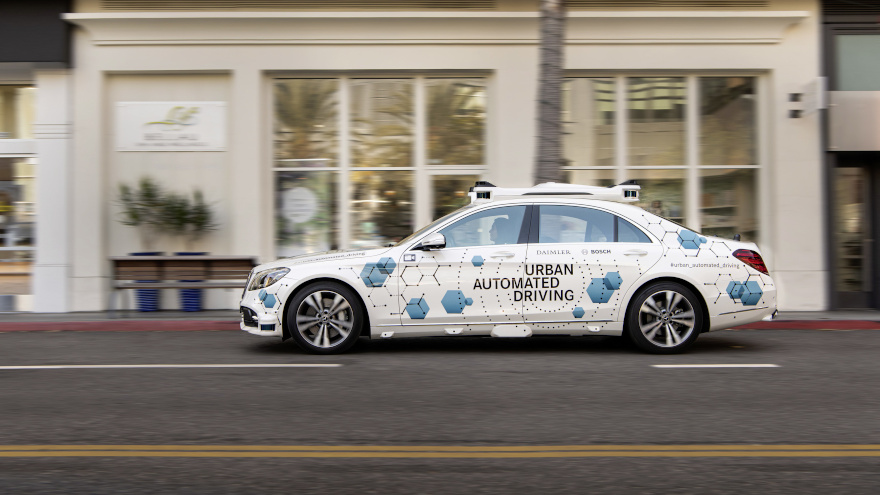Mercedes-Benz, Bosch automated ride-hailing pilot enters new stage

The Mercedes-Benz and Bosch pilot project for an app-based ridesharing service using automated Mercedes-Benz S-Class vehicles has been launched in San Jose, Calif. Photo courtesy of Mercedes-Benz.
By subscribing, you agree to receive communications from Auto Remarketing and our partners in accordance with our Privacy Policy. We may share your information with select partners and sponsors who may contact you about their products and services. You may unsubscribe at any time.
STUTTGART, Germany and SAN JOSE, Calif. –
Mercedes-Benz and Bosch have been working together for more than two years to develop products for automated driving in cities. Now, the two companies say their joint project has entered a new stage.
The companies have launched the project, which includes an app-based ride-hailing service using automated Mercedes-Benz S-Class vehicles, in the city of San Jose, Calif.
Mercedes-Benz says that in mid-2017, San Jose was the first U.S. city to invite private companies to perform field tests of automated driving and analyze the road traffic challenges.
“As a city, we want to know more about how automated vehicles can help improve safety and reduce congestion, as well as make mobility more available, sustainable, and inclusive,” city of San Jose director of civic innovation and digital strategy Dolan Beckel said in a news release.
For the project, a safety driver monitors the self-driving cars, which travel between West San Jose and downtown. The service will initially be available to a select group of users.
Those participants will use a Daimler Mobility AG-developed app to book a trip by the automated S-Class vehicles from a pick-up point to their destination.
Subscribe to Auto Remarketing to stay informed and stay ahead.
By subscribing, you agree to receive communications from Auto Remarketing and our partners in accordance with our Privacy Policy. We may share your information with select partners and sponsors who may contact you about their products and services. You may unsubscribe at any time.
Mercedes-Benz and Bosch say that ideally, the trial will provide insights into the further development of their SAE Level 4/5 automated driving system. The two companies also seek to gain additional insights into how self-driving cars can be integrated into an intermodal mobility system that also includes public transportation and car-sharing.
The companies say self-driving cars’ permanent 360-degree surround sensing could enhance safety, and their smooth driving style can improve traffic flow, especially in congested city traffic.
The Mercedes-Bosch project fits with San Jose’s “smart city” objectives, Beckel said. It will also help the companies develop guidelines for dealing with new technologies and “prepare for the traffic system of the future,” he said.
Robert Bosch GmbH head of engineering for urban automated driving Michael Fausten said that for automated driving to become everyday reality, the technology must work reliably and safely.
“And this is where we need tests such as our pilot project in San Jose,” Fausten said.
Mercedes-Benz AG head of autonomous driving Uwe Keller added, “It’s not just the automated vehicles that have to prove their mettle.”
Keller continued, “We also need proof that they can fit in as a piece of the urban mobility puzzle. We can test both these things in San Jose.”
The common goal of Mercedes-Benz and Bosch in their work on automated driving in cities is an SAE- Level 4/5 driving system for fully automated and driverless vehicles, including the software for vehicle management.
The companies, however, say they are not interested in prototypes. Instead, they are looking to develop a production-ready system that can be integrated into different vehicle types and models.
The companies mentioned the division of labor within the project, stating that part of Mercedes-Benz’s task is to make the jointly developed driving system ready for installation in the vehicle. Bosch develops and manufactures the components for urban automated driving that the alliance has identified.
In other news regarding automated ride-hailing service pilot project, Bosch and Mercedes-Benz said that they have added Daimler Mobility AG as a partner, and that company is developing and testing a fleet platform to accompany the pilot operation phase.
According to the companies, that allows potential ride-hailing partners to integrate self-driving Mercedes-Benz vehicles into their service portfolio.
The platform manages self-driving and conventional vehicles, including operation and maintenance. In the fall of 2019, an app-based mobility service for conventionally driven Mercedes-Benz vehicles went into operation in the Bay Area. The service is also available in Berlin.


